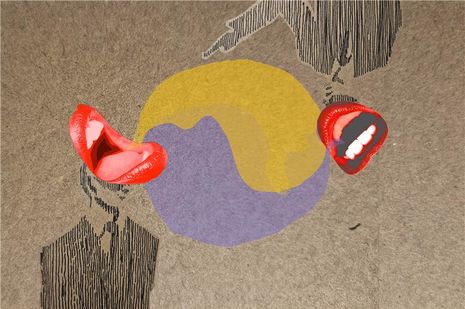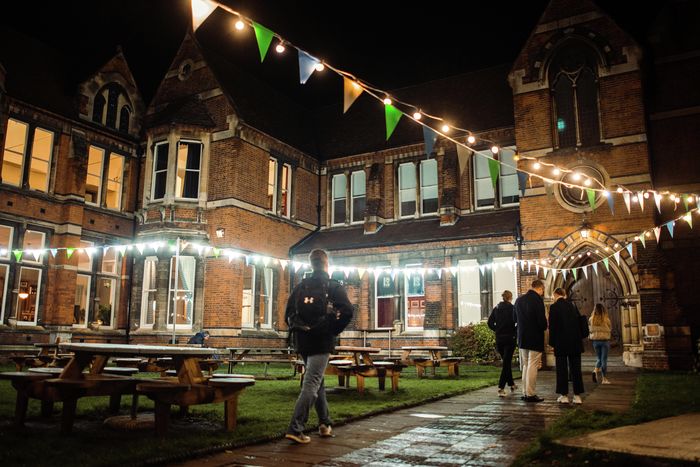The state of debate in an age of polarisation
After speaking with those who went head-to-head with Charlie Kirk, Francesca Evans reflects on how debate survives in an age shaped by algorithms, outrage and fear.

Housed in the Union, an institution that proudly declares its mission of ‘defending free speech since 1815’, students lined up to debate American far-right commentator Charlie Kirk. The evening unfolded with reasoned argument, firm handshakes, and discussions ending in the measured response of; I disagree, but thank you. Just four months later, news broke of Kirk’s death, a moment that reignited global conversations about political division, free speech and the importance of public debate. I spoke to students who faced Kirk in the Union’s despatch box about what it means to uphold open dialogue in our digital age, especially engaging with those whose views you fundamentally oppose.
The packed Union chamber was charged with an atmosphere of political interest. Damsith Wimalasena from Lucy Cavendish College was one among the several students who stepped up to the lectern and faced Charlie Kirk. On his motivation to debate Kirk, Damsith commented that, “someone must challenge ideas, especially the ones we disagree with. Silence isn’t a strategy.”
For ARU graduate James Loveridge, taking part was a way to show that “disagreement doesn’t have to be hostile.” He believed that political violence “is not a sign that we need less debate: we need more.”
“In the online space where algorithms continually reinforce echo chambers of belief, he warns of ‘increasing political polarisation’”
Graduate Rudi Ellis-Jones, who also debated Kirk in Cambridge, added that the focus shouldn’t just be on Kirk himself, but on the wider picture: “We should reflect on all of those lives and what it says about the world we live in, rather than focus on division.”
Damsith outlined that free speech is “the ability to express difficult or unpopular opinions without being immediately villainised.” Unfortunately, since the debate, the Sri Lankan student has been on the receiving end of online racist abuse. The attention online has made him care “less about noise and more about purpose.” With the debate going viral on social media, with Damisth’s video received more than 40 million views online.
Media coverage and online discourse undeniably exposes debate in a way that can put pressure on free speech, yet the Kirk debaters I spoke to argued that it “means what we say matters more.” Fitzwilliam student Tilly Middlehurst has seen an explosion in her following since the debate, and her Instagram profile promotes the importance of debate as political action: ‘because words can still win’.
“Political events, like the death of Charlie Kirk, inevitably leave society re-examining age-old questions of dissent and free speech”
An Instagram post, which some deemed offensive, recently led to Oxford Union president-elect George Abaraonye receiving a no-confidence vote. The Oxford Union “unequivocally condemn[ed] the reported words and sentiments.” However, the Union was also “deeply concerned” by the subsequent racial abuse and threats he received, which undermined the bastion of free speech the Union champions. Middlehurst commented on an Instagram post, appalled by “some of the most vile racist attacks I have ever witnessed online” that George was subjected to.
All interviewees reflected on how the digital era has reshaped and threatened free speech. Archie Mackintosh, from Jesus College, points to the anonymity of the internet, which allows people to “spread hate and disinformation with no fear of social consequence.” In the online space where algorithms continually reinforce echo chambers of belief, he warns of “increasing political polarisation.” Trinity Hall student Kai Bevan shared a similar concern, noting that with the rise of AI, “ideas, particularly ‘bad ideas’, spread more quickly than ever.” In such a climate, public debate feels more vital than ever. As Rudi aptly put it: “Debate holds people to account in an age where accountability is an option, not a requirement.”
Debate is a necessary standard in society and something that should be upheld in Cambridge. But in an age of ‘cancel culture’, what does free speech really look like in student life? Damsith believed that students continue to be interested in debate. But some remain silent, “not because they don’t care, but because they don’t want to deal with the consequences of saying something ‘wrong.’”
Kai, however, is not concerned about being cancelled. He explained that “any view I hold, I believe I can rationally justify. I am also open to changing my mind about every single opinion I have given sufficient evidence.” Rudi added that “if the majority of students use their freedom of speech to argue against you – that’s not being cancelled, that’s freedom of speech, and that’s life.” Ultimately, Archie reminded us that, “if you think you’re correct, you don’t win people over by silencing opposition. You win them by meeting them with grace, humility, and respect.”
Political events, like the death of Charlie Kirk, inevitably leave society re-examining age-old questions of dissent and free speech. Damisth hoped it would “teach us some boundaries, between disagreement and dehumanisation.” James added that while some students hold back from sharing their views, “university should be a place where people can speak openly and learn through disagreement.” It is now more essential than ever to engage in open, meaningful discussion, both within universities and beyond. As Archie summed up: debate is “not just a nice to have it. It’s a must.”
 News / Judge Business School advisor resigns over Epstein and Andrew links18 February 2026
News / Judge Business School advisor resigns over Epstein and Andrew links18 February 2026 News / Gov grants £36m to Cambridge supercomputer17 February 2026
News / Gov grants £36m to Cambridge supercomputer17 February 2026 News / CUCA members attend Reform rally in London20 February 2026
News / CUCA members attend Reform rally in London20 February 2026 News / Union speakers condemn ‘hateful’ Katie Hopkins speech14 February 2026
News / Union speakers condemn ‘hateful’ Katie Hopkins speech14 February 2026 News / Hundreds of Cambridge academics demand vote on fate of vet course20 February 2026
News / Hundreds of Cambridge academics demand vote on fate of vet course20 February 2026










